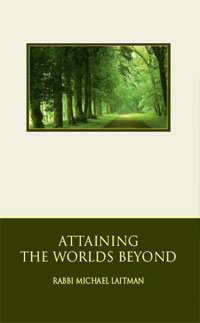Everything Comes from the Creator
Even though the spiritual work of raising altruism above egoism is carried out within the heart, while that of raising faith over the assertions of the intellect is carried out within the mind, both are contingent upon our rejection of the intellect that was given to each of us at birth, as well as upon the rejection of self-gratification and self-affirmation.
This is because, even while working towards altruistic aims, one still prefers to see and know to whom one gives and who receives the fruits of one’s labor—and in such a case one has nothing but the faith in the existence of the Creator and the faith that He is accepting the fruits of one’s work.
Here we find the notion of the oneness of the Creator, in accordance with the principle that “there exists nothing but the Creator.” We must recognize the Creator as the One sending everything that we sense and perceive in our minds, bringing us to a particular line of thought, which in turn leads us to certain decisions and resolutions.
Only after we acknowledge all of the above can we gain a proper perspective on everything that transpires.
The 2 Aspirations of the Soul
Kabbalah in its entirety concentrates on the Creator and on His actions. For this reason, Kabbalah is called by the names of the Creator.
Kabbalah speaks about us as being a part of the Creator that He distanced from Himself, having bestowed egoism upon us. For this reason, our souls are comprised of two opposing parts. The first of these is the divine part, which exhibits its own desire to perceive the Creator (in some of us), thus causing people to begin searching for something spiritual in order to be fulfilled internally. At the same time, the pleasures pursued by others around us no longer satisfy to those seeking spiritual fulfillment.
The second part of the soul is that specially created egoistic nature that people experience in full measure: the desire to possess everything, to know everything, to do everything, to see the result of all their actions, that is, to see a part of the “self” in all one’s surroundings. The egoistic part of the soul is the only part that was created, since the altruistic part of the soul is a part of the Creator Himself. Having taken His desire from within Himself and having endowed it with egoism, He thereby distanced this part from Himself and it became the soul, a creation separate from Him.
Gradually Paying more Attention to the Soul
The soul is considered a creation precisely because it contains a part of something new—its egoism—a quality that had not existed before, as nothing of the kind exists within the Creator. It is the notion of the soul, which consists of a part of the Creator and a part of the newly created egoistic feeling “to receive everything into oneself, that Kabbalah deals with. It is the soul, rather than the body, that is discussed in the Bible, because the body, consisting of flesh and bone, is like the flesh and bone of the animals, and its end is decay and a return to the elements of this world.
We sense ourselves as bodies because we do not perceive our souls.
But as we begin to perceive the soul, the sense of the physical body, of its desires and of its pains, diminishes, when the soul asserts itself more and more. When we are further advanced on the spiritual path, we do not sense the desires of the body altogether, because we pay attention only to the soul—the part of the Creator within us.
The Aspirations of Altruism Vs. Egotism
Thus, the “body” begins to represent the spiritual desires, rather than the desires of the flesh and bone, which one almost doesn’t sense any longer.
The Bible tells not of our physical bodies, the mass of flesh and bone, but of the two aspirations of the soul—of the desire of the divine part to perceive the Creator and to unite with Him, and of the desire of the egotistical part towards self- gratification, self-satiation, and a perception of oneself instead of the Creator.
Both of these aspirations are known in Kabbalah as “the “body.” This refers to both the egoistic body and the physical body, i.e., the body of our world, since only our world is characterized by ego, and the spiritual body, since altruistic desires are the desires of the Creator, characteristic of the spiritual world.
In all instances, the Bible describes how our souls are affected in various settings and circumstances. It also deals with our desires, focusing on how the Creator alters them, and on how each of us can alter them, or rather, how we can ask Him to alter them, since we ourselves are incapable of changing them.
Becoming Part of the Creator
But the beginner’s main challenge is to hold on by willpower and to concentrate upon the fact that in spite of one’s multitude of thoughts and desires, all of these emanate from the Creator; all these thoughts and desires, so vastly different, and at times so low, are sent by the Creator.
The Creator does this so that, in spite of all obstructions, the individual persistently continues to uphold the bond with the Creator by preserving one’s faith that all these thoughts and desires are sent by the Creator. Thus, struggling with them should strengthen our faith that all emanates from the Creator.
As we strengthen this conviction within ourselves, we can reach such a level that this sense will always be present, despite the ever-increasing obstacles that will be sent by the Creator. These are intended to further strengthen this very sense.
Then, our constant faith in the Omnipresence of the Creator will combine with the feeling of His Presence within us, and the Creator will be “robed” in us, thus determining all of our thoughts and desires. At this point, we will become part of the Creator.
 “Who Else Wants to Become a Part of the Creator?” is based on the book, Attaining the Worlds Beyond by Dr. Michael Laitman.
“Who Else Wants to Become a Part of the Creator?” is based on the book, Attaining the Worlds Beyond by Dr. Michael Laitman.

